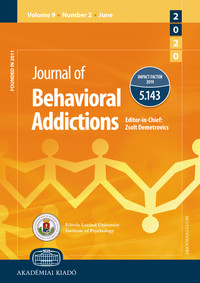The psychometric properties of the Revised Illness Perception Questionnaire (IPQ-R) regarding Internet gaming disorder in a general population of Chinese adults
The psychometric properties of the Revised Illness Perception Questionnaire (IPQ-R) regarding Internet gaming disorder in a general population of Chinese adults
Author(s): Joseph T.F. Lau, Le Dang, Ray Y. H. Cheung, Meng Xuan Zhang, Juliet Honglei Chen, Anise M.S. WuSubject(s): Behaviorism
Published by: Akadémiai Kiadó
Keywords: illness representation; Illness Perception Questionnaire-Revised; online gaming; behavioral addiction; Internet gaming disorder
Summary/Abstract: Background and aims. Internet gaming disorder (IGD) has been recognized as a mental illness. Cognitive and emotional illness representations affect coping and health outcomes. Very little is known about such perceptions related to IGD, in both general and diseased populations. This study examined the psychometric properties of the Revised Illness Perception Questionnaire (IPQ-R) for IGD in a general population that included mostly non-cases while a small proportion of the sample was IGD cases. Methods. An anonymous cross-sectional telephone survey was conducted in a random sample of 1,501 Chinese community-dwelling adults (41.3% male; mean age = 40.42, SD = 16.85) in Macao, China. Results. The confirmatory factor analysis identified a modified 6-factor model (i.e., timeline cyclical, consequences, personal control, treatment control, illness coherence, and emotional representations) of 26 items that showed satisfactory model fit and internal consistency. Criterion-related validity was supported by the constructs' significant correlations with stigma (positive correlations: timeline cyclical, consequence, emotional representations; negative correlations: illness coherence). Ever-gamers, compared to never-gamers, reported higher mean scores in the subscales of personal control and illness coherence, and lower mean scores in time cyclical, consequence, and emotional representations. Among the sampled gamers, probable IGD cases were more likely than non-IGD cases to perceive IGD as cyclical and involved more negative emotions. Conclusions. This study shows that the revised 26-item version of IPQ-R is a valid instrument for assessing illness representation regarding IGD in a general population of Chinese adults. It can be used in future research that examines factors of incidence and prevention related to IGD
Journal: Journal of Behavioral Addictions
- Issue Year: 9/2020
- Issue No: 3
- Page Range: 654-663
- Page Count: 10
- Language: English

